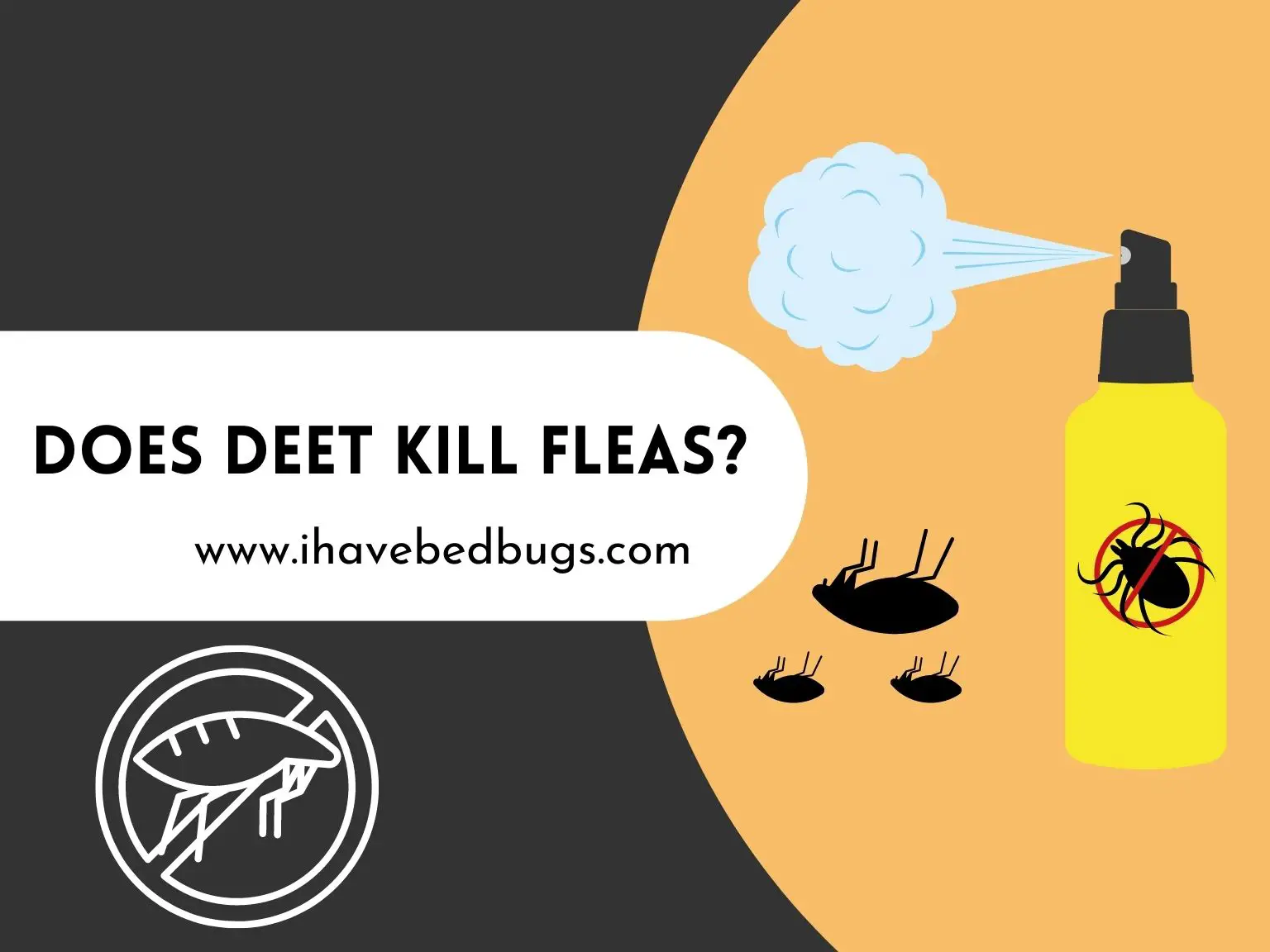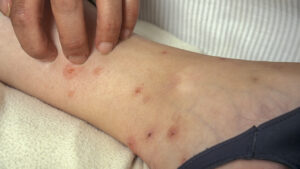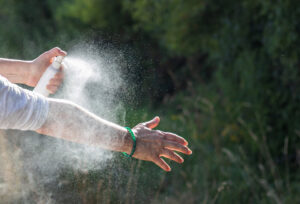What Is DEET?
DEET, also known as N, N-diethyl-meta-toluamide, is a man-made chemical found in various insect repellents. It’s mostly used to repel ticks and mosquitoes; however, it can also control fleas.
Repellents produced with DEET are usually applied to the skin to keep insects like fleas and mosquitoes away.
Although most insect repellents come in the form of sprays, you should note that DEET is used in a wide range of products, including lotions and towelettes. For instance, did you know that about 120 products manufactured with DEET by about 30 companies are currently registered with the Environmental Protection Agency (EPA)? Yes, that’s right.
Does DEET Bug Spray Kill Fleas?
Although DEET is widely used in insect repellents to control biting insects like fleas, it can’t kill them. So if you aim to kill these harmful pests, then DEET repellents shouldn’t be an option.
So how exactly do these insect repellents work? Fleas mostly depend on their sense of smell and their ability to sense carbon dioxide to locate hosts. Although they can see, their eyes just act as a light sensor, so they can’t clearly identify images.
When you apply an insect repellent that contains DEET, the chemical makes it hard for fleas to smell you. In other words, it interferes with the receptors that make it possible for fleas to pick up scents. Hence, DEET is great for repelling fleas and keeping these insects away from you.
You should be careful, though; repellents can sometimes cause skin irritations. We’ll take a closer look at that later on in this post.
How to Use DEET to Control Fleas
Although not all insect repellents can be used on the skin, DEET is safe for your skin. It only becomes harmful if you’re allergic to the chemical. Continue reading if you’re wondering how you can effectively use insect repellents that contain DEET to repel fleas.
Read the Instructions on the Label
Before using DEET insect repellents, always ensure that you read the instructions on the packaging first. Most people tend to avoid this part, especially when they’ve been using DEET products for a while.
Applying repellents on your skin according to the label directions is important. This will come in especially handy if you’re using a DEET bug spray for the first time.
If the bug spray doesn’t come with any instructions, you have every right to be concerned. An effective insect repellent will come with instructions on using the product.
Apply DEET Insect Repellents to Exposed Skin
When using insect repellents containing DEET, you should apply the bug spray only on the exposed parts of your skin. Fleas usually bite areas below your knee, such as your calves, ankles, and feet.
However, you can also use insect repellent on your hands and face for added protection. If the DEET insect repellent gets on your clothing, ensure that you wash them with soap and water to remove any traces of the repellent.
Some Things to Consider When Using DEET Repellents
Because DEET is a chemical, you should exercise caution when applying it to exposed skin. We’ll take you through some measures to take to ensure that you’re using the insect repellent safely.
- While using DEET repellents, don’t spray the liquid directly on your face. Instead, put the contents of the spray bottle on your hand, then apply it to your face. This will prevent DEET from getting into your eyes, mouth, and nostrils. If products containing DEET gets into your eyes, that can cause watery eyes and irritations, which you want to avoid. You may also experience vomiting and stomach upset if you swallow DEET products.
- It’s advisable to use DEET repellents in outdoor spaces because that reduces inhalation risks. If you must use a DEET insect repellent indoors, ensure that the area is well-ventilated. Vapors from the insect repellent can remain in the atmosphere for some time after use. That’s why using it outdoors is mostly recommended.
- Another thing to watch out for when using DEET insect repellents on your skin is to avoid spraying on wounds and cuts.
- Don’t spray any DEET insect repellent on plastic and leather products since it can cause damage to them.
Disadvantages of Using DEET Insect Repellent
Like anything in the world, DEET repellents also have their disadvantages. Here are the most common ones.
Can Cause Irritations
In some cases, DEET products can cause irritations to the skin. That’s why it’s advisable to avoid spraying the insect repellent on wounds or cuts. However, if you’re not sure whether using DEET will be harmful to your skin, this is what you should do.
First, spray just a little of the repellent on your skin and observe for a while before applying the repellent on the other exposed parts of your body. If you notice rashes or irritations, you should avoid using DEET repellents.
Later in the article, we’ll look at some alternatives to DEET, which you can use to repel fleas.
Can Cause Damage to Synthetics
Although DEET can’t cause damage to natural fibers like cotton, it can damage some items made from vinyl, rubber, or plastic. Items such as watch crystals, lenses, shoes, and combs should be kept away from products containing DEET.
Unsafe for Children Under 2 Months
If you have children under 2 months, don’t apply repellents containing DEET to repel fleas and other biting insects. For children older than 2 months, always ensure that they don’t have access to DEET repellents.
When using DEET repellents for children, never allow them to use them independently, especially when they’re unsupervised.
Spray some of the repellent on your hands and use it on your children’s hands, legs and face. Contact your local poison control center immediately if you find out that your child has swallowed DEET.
Has an Unpleasant Smell
Although DEET effectively keeps fleas away, it has a strong smell that many may find unpleasant. This is due to the presence of the active ingredient it’s made up of. But, of course, you can overlook this since your goal is to repel fleas and other insects.
Natural Alternatives for DEET
Did you know that you can make your own flea repellent at home if you have the necessary ingredients? Here are some replacements for DEET which are equally effective. The good thing is that most of them are one form of essential oil you can put together from the comfort of your home.
Lemon Eucalyptus Oil
Lemon Eucalyptus Oil is a natural source of repelling fleas and other bugging insects. It poses zero harm to your skin and immediate environment and is also approved by the Center for Disease Control (CDC) as an effective ingredient for mosquito repellent.
Some previous research also backs the flea-repelling power of this oil, stating that “a mildly concentrated mixture could repel fleas and mosquitoes on for about three hours.”
You can prepare it easily by mixing a full measure of lemon eucalyptus oil and a one-tenth portion of sunflower oil.
Lavender
Did you know one of nature’s best fragrances also repels insects? The right amount of lavender flowers do the magic. This essential oil doesn’t just give a soothing fragrance, but it keeps fleas and mosquitoes away since it has anti-fungal, anti-bacterial, and analgesic properties.
Crush a good amount of the flowers and squeeze out the oil, dub some of it or pour into a spray bottle, and apply over the bite-prone areas.
Thyme
If you’re a mountain hike, camp, or outdoor-loving person, this is your best opportunity to repel insects like mosquitoes. You can apply the oil in small portions directly to your skin or throw a couple of slightly dried thyme leaves into an outdoor fire.
You can make this at home by combining a few drops of thyme with any other base oil like olive oil. You’d also have it in a spray form when combined with about 5-6 ounces of potable water.
Citronella
This is another extra-efficient repellent. You may find it quite tricky when making it yourself, but attention to detail will get you the correct formulation and protection you need. Again, it’s important you have all the herbs which come together to make the concentrated volume needed.
Some products such as Druide Citronella Insect Repellent contain standard amounts of citronella, which work effectively against mosquitoes and similar insects.
Neem Oil
You might already know neem has numerous health benefits. It also serves as an efficient flea and mosquito repellent. You just have to be careful not to apply directly as it irritates the skin. However, research mentions the oils from neem can protect you for about three hours.
You can combine about 150mm of extra virgin neem oil in water or another base oil to reduce the amount of irritation it may cause and, at the same time, repel mosquitoes.
Clove and Peppermint Oil
Some studies have shown that oils extracted from cloves and peppermint in combined ratios, are effective against flea and tick infestations. In addition, a couple of drops of both of these essential oils is said to be more effective than some common insect repellents.
Dilute the mixture with two glasses of water and transfer into a spray bottle or pump sprays (in the case of larger quantities) and spray directly into all flea-prone or infested areas.
Handling Insect Bites
When exposed to insects such as fleas and mosquitoes, you’re prone to bites without any protection from DEET items or any alternate repelling products.
There’s still a possibility to have a mosquito bite or a flea infestation even after you’ve applied and used your DEET or insect repellent. Due to the active ingredients in DEET products, you’d mostly not be able to use them as a treatment since the treatments are usually natural. However, here are some ways to manage bug bites, mosquito bites, and other insect infestations:
If a mosquito bites you, you can dub a piece of treated clothing into some amount of vinegar at the point of bite. Slices of raw onions and fresh garlic, too, are known to reduce the possibility of an immediate infection. Lastly, pharmaceutical products such as calamine can also help prevent any infection from the bite.
However, some bites from certain fleas and other insects such as lice, black flies, bedbugs, and some spiders can be very fatal and may require immediate attention upon incident. The safer thing to do is be aware of your environment, exercise enough pest control, wear clothing that covers bite-prone areas, and use just enough repellent.
Protecting Yourself From Flea Bites
It’s one thing handling insect bites, and it’s another keeping yourself and pets safe from biting flies and fleas. Although, as mentioned, some fleabites are irritating; only a few get to be extremely serious. Some fleas also carry infections such as Lyme disease and the West Nile virus from other organisms such as tapeworms.
Some protective ways are as follows:
Flea Treatment
Flea treatments are just like treating any other ailment with only a slight difference–that this is a more proactive approach.
You can begin with your home pets– fleas are quite common in some seasons, and your pet is a good blood meal for them. Then, treat your pet with some flea meds prescribed by your vet.
Regular shampoo baths for your pet also helps keep them down–you might just avoid DEET after your practice this. A healthy pet will mean a flea-free home.
Perform Flea-Proof Activities
Basic housekeeping cuts it. Just keep doing these same things you do with your home; continuous cleaning, vacuuming, and using naturally scented soap, among others. Even though fleas aren’t exactly invited by dirt, an environment with no hiding places for them would mean they won’t survive for long.
What Are the Dangers of DEET?
Some people have allergic reactions when applying DEET to their skin, especially for an extended period. They develop reactions like redness, rash, and swelling as a result of that.
DEET may also be toxic for your pets, as we’ve discussed extensively. When it comes into contact with their eyes, it can lead to issues like conjunctivitis, scleritis, corneal ulceration, and blepharospasm.
If your pet inhales DEET, it can lead to airway inflammation and difficulty in breathing. There may also be the case of gastrointestinal issues like vomiting, disorientation, tremors, seizures, and shaking.
Ingesting DEET can lead to seizures and brain malfunctioning. This can be severe in children. Birds, fish, and aquatic vertebrates may also be negatively affected by DEET. Even low concentrations can be toxic.
DEET remains in the air when it’s sprayed as a mist and would need to be broken down by the atmosphere. This is also dependent on the wind, temperature, and relative humidity. When DEET enters the soil, it’s moderately mobile.
Some Myths and Facts about DEET Use
Many people have several thoughts and misconceptions regarding DEET and how it works. We’ll show you some of these misconceptions and educate you on the actual facts.
DEET Kills Mosquitoes
DEET doesn’t kill mosquitoes. Instead, it’s a big deterrent to mosquitoes and mosquito bites. The compounds in DEET interfere with most insects’ neuron and receptor network, such as the mosquitoes, which they use to sense carbon dioxide and lactic acid, making it difficult for them to stay in areas where DEETs are applied.
DEET Works Only on Mosquitoes
The fact is simple. The compounds comprising DEETs are effective on most insects with antennae structures like mosquitoes. DEETs protect you against many other flies, fleas, and gnats, among other insects.
Children Must Not Use DEET Products
Facts by the federal regulators explain that concentrations of DEET can be used by people of all ages on the condition that the label directions are well followed.
This means that children can equally use DEETs as much as any adult. The only difference should be in the quantity used at a particular time, which should be slightly lesser than what adults use.
The American Academy of Pediatric supports this fact by stating that products with a DEET concentration of 30% can be used on children of about two months and older. They also state that the products containing DEET are effective repellents and should be used when necessary for protection from bites from insects and ticks that can cause diseases.
Essential oil-based repellent products give your child fresh skin, alongside keeping it free from skin irritation. Either way, for every product, it’s essential to read all product label instructions to ensure proper applications.
The Smell of DEET Doesn’t Repel Mosquitoes
DEET makes it hard for mosquitoes to bite you. Applying it forms this vapor barrier on your skin that deters mosquitoes from landing on you.
DEET Is the Same as DDT
DEET is a compound used as the main ingredient in most insect-repelling products, while DDT is a harmful chemical which has been banned in several countries due to its adverse effects on the environment.
Higher Percentage of DEET Means Better Protection
Not true. DEET concentrations are directly proportional to the length of protection it gives you. For example, highly concentrated DEET products can protect for up to about eight hours.
The Smell of DEET Is the Main Repellent
There’s no exact telling of how DEETs work to keep away insects. However, major research facts point out that DEET forms an almost invisible layer on your skin’s surface that keeps off insects when they’re close.
FAQs
What Other Insects Does DEET Repel?
DEET repels a wide range of pests. Whenever you’re looking for an insect repellent or bug spray, make sure you believe the brand. Find top reviews and detailed descriptions that explain how you can use it.
Does Bug Spray Work on Fleas?
A DEET-based bug spray can deter fleas by interfering with the neurons aiding their sense of smell. DEET has been proven to be very effective in this regard. When it’s used as an ingredient in bug spray, it’ll repel the fleas and deter the insects. However, it’s not directly used as a contact insecticide.
Does Deep Woods Off Kill Fleas?
Deep Woods Off provides long-lasting protection that won’t sweat off against insects like ticks, mosquitoes, and black flies. It also repels fleas, so you can enjoy your outdoor sessions.
Are Fleas Harmful to Both Dogs and Cats?
Yes, they are. Flea infestations can cause inflammation, skin infections, blood loss and can even transmit tapeworms.
How Do You Know if Your Pet Has Fleas?
One of the most common signs is that you see flea dirt in your pet’s hair when using a flea comb. When you spray this flea dirt with hydrogen peroxide, it bubbles and turns red. This is because the flea dirt may be dried blood or flea poop.
Why Should You Get Rid of Fleas?
You should get rid of fleas if you don’t want your home to develop into a full-blown infestation. Fleas reproduce rapidly, so a little infestation of them could result in their increase in your home and pets. They can also lay their eggs in your carpets and cushions, which can lead to bigger issues. That’s why you need to get rid of them at first sight.
What Do Fleas Hate the Most?
Fleas use their strong sense of smell to find food sources. You can use scents like DEET, lemongrass oil, cedarwood, mint, clove oil, rosemary oil, citrus, and vinegar. These scents will repel them and prevent their infestation in your home.
Last Words
That’s it- everything you need to know about DEET and fleas. Apply these tips the next time you have an outdoor session and stay protected.
References
http://www.idph.state.il.us/envhealth/deetfacts.htm
https://www.bobvila.com/articles/best-flea-spray/
https://health.clevelandclinic.org/is-deet-bad-for-you-and-your-kids/
https://entomology.ca.uky.edu/ef602
https://www.sierraclub.org/sierra/5-deet-free-ways-protect-yourself-bugs
https://www.healthline.com/health/bug-bites#pictures-of-different-bites-and-stings
https://www.healthline.com/health/kinds-of-natural-mosquito-repellant#geraniol
http://npic.orst.edu/factsheets/DEETgen.html
https://off.com/en/education/active-ingredients/7-myths-and-facts-about-deet
https://www.epa.gov/insect-repellents/deet
https://www.newswise.com/articles/myths-and-facts-about-deet
https://off.com/en/education/active-ingredients/7-myths-and-facts-about-deet




